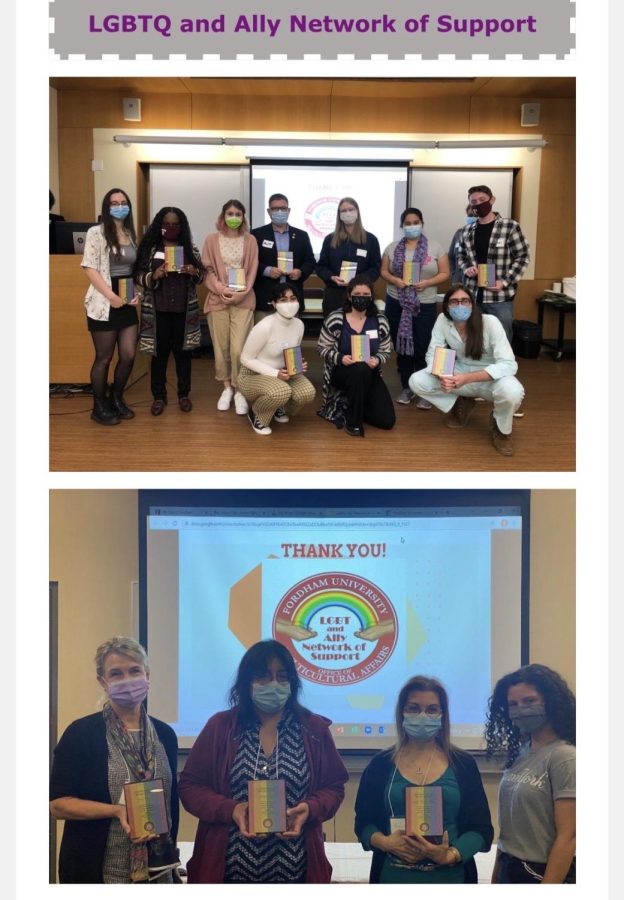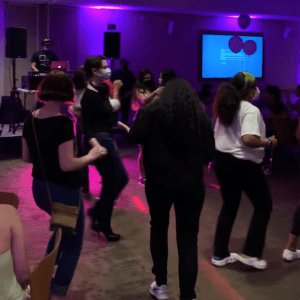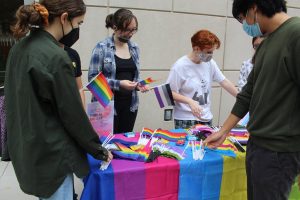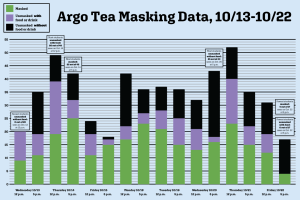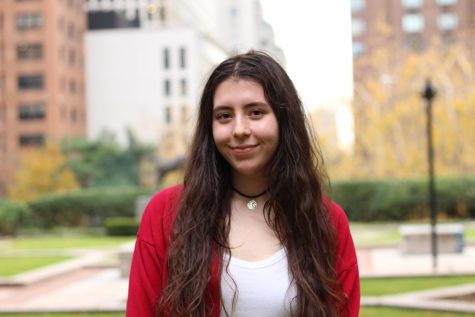OMA’s LGBTQ+ and Ally Network Hopes to Foster Inclusion at Fordham
Presenters from OMA, the deans’ office and CPS introduced different discussions on supporting LGBTQ+ students and allyship
COURTESY OF LEIGHMARIE WEBER
The Office of Multicultural Affairs hosted its annual LGBTQ+ and Ally Network of Support training for how to best support LGBTQ+ students.
November 7, 2021
Correction: A previous version of this article misspelled LeighMarie Weber’s name. It has been edited to reflect this change as of Nov. 9, 2021.
The Office of Multicultural Affairs (OMA) hosted its annual LGBTQ+ and Ally Network of Support training during two sessions held on Oct. 14 and Oct. 21. Leigh Marie Weber, the associate director of OMA, said a total of six participants attended the FCLC session, while at FCRH, there were 18 attendees.
Weber reported that the program aimed at encouraging an inclusionary environment for LGBTQ+ members of the Fordham community by training a network of allies. There are 1,010 community members who have been trained through OMA’s program and inducted into the network since it began in the spring semester of 2010.
The training, held in the South Lounge, was open to all Fordham community members. Registration and attendance were required in order for participants to be counted as part of the network.
The training was facilitated by Weber and Lilibeth Ramos Flores, an OMA graduate intern.
Weber introduced the first session by explaining the program’s mission: that participants are able to “actively work toward promoting an environment in which each member of the university community is welcome and valued.”
She added that participants should develop an understanding, acceptance and appreciation of LGBTQ+ students and identify and challenge behavior and language that are offensive and exclusive to LGBTQ+ students.
After sharing statistics of a senior class survey in 2019, Weber explained that the Fordham community has more inclusion work to do.
“We are in a spring time that has potential for new possibilities and change.” Rev. Bryan Massingale, S.J.
“Students feel across the board that the community here at Fordham welcomes everyone regardless of their sexuality … however, some students feel as though specific identities do not feel as included in the community,” she said.
Following Weber’s introduction, professor of theology Rev. Bryan Massingale, S.J., discussed the existing struggles of the LGBTQ+ community, the Ignatian values in LGBTQ+ affirmation and the correlation between proactive allyship and attendance at a faith-based university.
Massingale said, “The struggle is good news … it is a sign of diversity and conflict showing change, a necessary place to be,” he said. “We are in a spring time that has potential for new possibilities and change.”
“Faith can be an important resource in being proactive allies for the LGBTQ+ community,” he said. Massingale added that he sees the struggles as “hopeful progression.”
Jenifer Campbell, dean of students at Lincoln Center, discussed the availability of campus and community resources for LGBTQ+ students. Campbell urged students who may be “upset or struggling” to be guided towards Counseling and Psychological Services (CPS) on campus.
She said, “If there is an emergency situation, there are many ways we can help and guide students.”
The first session of the training included a variety of interactive activities among participants, including “Step In,” which showcases the different identities present in the room. The activities served to create a foundation for context on LGBTQ+ awareness and an additional understanding of one’s role as an ally.
“The ways people can show allyship may be very public or personal and can manifest in different ways.” Juan Carlos Matos, assistant vice president for student affairs for diversity and inclusion
The second session of the training program framed the elements of allyship, taught by Juan Carlos Matos, assistant vice president for student affairs for diversity and inclusion.
Matos’ presentation addressed the qualities of being an ally. Matos said, “The ways people can show allyship may be very public or personal and can manifest in different ways.” He said “continuing to engage in learning opportunities or show support are ways to be an active ally.”
Matos emphasized that being an ally is important, especially on campus, to “make a contribution to supporting, respecting and improving the lives of LGBTQ+ students.”
The program will explore deeper dialogue in the spring, continuing the conversation about LGBTQ+ identity and race relations.
Following Matos was Jessica Del Vita, a doctor of psychology in CPS, who shared knowledge on mental health within the LGBTQ+ community on campus.
Del Vita expressed that students in the LGBTQ+ community are more likely to experience “high levels of distress, mental health academic impairment, and more likely to utilize services.” She continued, “We see this at our counseling center, by diversifying our staff so students feel welcome when they walk in the door, which is very important to us.”
Her presentation led to a discussion on how participants should acknowledge the experiences of LGBTQ+ students, connecting back to the responsibility of allies on Fordham’s campuses and in other communities.
The training event ended with a closing ceremony in which participants received a plaque and a pin certificate of completion. Weber thanked the participants for their time and dedication. She hopes more Fordham community members will sign up for the session in the spring semester, where the program will explore deeper dialogue, continuing the conversation about “LGBTQ+ identity and race relations.”

